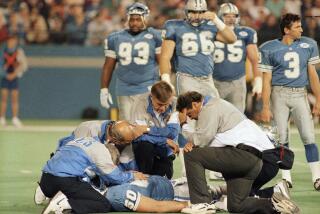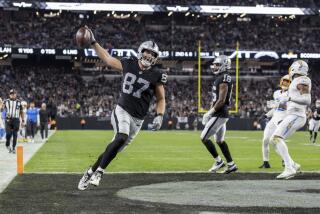Darryl Stingley, 55; his paralysis showed brutal side of football
- Share via
Darryl Stingley, who in 1978 was paralyzed by a catastrophic on-field collision and became emblematic of how brutal pro football can be, died early Thursday. He was 55.
Stingley was found unconscious in his Chicago apartment at 2:30 a.m. by his caregiver. He was taken to Northwestern Memorial Hospital, where he was pronounced dead about an hour later. An autopsy revealed that contributing factors to his death were bronchial pneumonia, quadriplegia, spinal cord injury and hardening of the arteries.
A former wide receiver for the New England Patriots, Stingley was paralyzed from the neck down in a National Football League exhibition game Aug. 12, 1978, after absorbing a hit by Jack Tatum, a widely feared safety for the Oakland Raiders.
Stingley, a onetime Purdue standout who had been an NFL starter for six seasons, suffered a broken neck and is believed to be the only NFL player rendered quadriplegic by something that happened on the field.
Technically, he had “incomplete quadriplegia” with limited movement in his right arm. He wore a brace on his right arm that allowed him to dial a phone, surf the Internet and navigate his motorized wheelchair.
In 1992, he completed work toward his bachelor’s degree at Purdue.
Mike Haynes, a former Patriots defensive back who was a teammate and friend of Stingley, said the collision changed the way some defensive players approached their jobs.
“Back in those days, a lot of times even though a guy couldn’t catch the ball, you would hit him hard to try and send the message that you were there, and that if it was a catchable ball he was going to get punished,” Haynes said Thursday in a telephone interview.
“Guys would take those shots all the time, and I don’t think anybody ever thought that you could paralyze someone or end a guy’s career. So that pretty much changed the way I approached the game after that.”
Despite the increasing size, strength and speed of NFL players, there have been relatively few cases of paralysis.
Detroit Lions guard Mike Utley suffered a neck injury in a 1991 game that left him paralyzed from the waist down, and several players have had temporary paralysis, among them Dennis Byrd of the New York Jets, Frank Bush of the Houston Oilers and Tommy Maddox of the Pittsburgh Steelers.
In 2003, for a story on the 25th anniversary of the collision, Stingley said he had forgiven Tatum -- although they never spoke after the incident -- but he wondered whether the immediate response to his injury might have contributed to his condition.
“If you look at pictures [taken on the field], someone took my helmet off, and that helmet was on tight,” he said.
“That field at the Oakland Coliseum was watered down too. And it looked like a bunch of amateur golfers had come through there -- there were so many divots. When I was rolled across the field, my head was like a bobble-head doll. Ask a physician or anybody how important it would be to stabilize the patient’s head.
“When I hear about the Dennis Byrd story, how he was a quarter-inch from being paralyzed, it just makes you think.”
Three years ago, HBO was unsuccessful in attempting to reunite Stingley and Tatum. Stingley declined, reportedly after learning that the TV meeting was a promotion for another book by Tatum, saying he would meet with Tatum but only for the right reasons.
“It’s still a story that everybody, including me, would like some closure on,” Stingley said at the time. “But it seems like every time we get to that point, there is something on his side where he is trying to capitalize from it.”
For 12 seasons after his injury, Stingley remained on the Patriots payroll, working as a consultant for the team from his Chicago home.
“This is a sad day for all who knew Darryl Stingley,” Patriots owner Robert Kraft said in a written statement. “I had the pleasure of meeting Darryl on several occasions and was touched by his positive outlook on life.”
In 1983, Stingley began a nonprofit foundation to benefit troubled youths on Chicago’s West Side, where he grew up.
Stingley is survived by his wife, Martine, and three sons, Hank, John and Derek. Derek, who played defensive back in college, coaches the South Georgia Wildcats, a minor league franchise of the Arena Football League.
sam.farmer@latimes.com The Associated Press contributed to this report.
More to Read
Go beyond the scoreboard
Get the latest on L.A.'s teams in the daily Sports Report newsletter.
You may occasionally receive promotional content from the Los Angeles Times.











